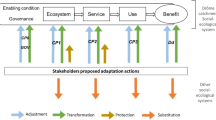Abstract
Winter tourism and mountain agriculture are the most important economic sectors in a major part of the Swiss Alps. Both are highly sensitive to changing climatic conditions. In the framework of the CLEAR project, results from climate impact research in the field of tourism and agricultural production were used to investigate the perception of climatic change by stakeholders and to assess possible adaptations. We used a participatory integrated assessment (PIA) to involve the knowledge, values and experiences of the various social actors in tourism and agriculture (e.g., skiers, tourism managers, farmers) in the research process. Whereas climate change may have various severe direct impacts on the tourism industry, depending on the region, agricultural production may generally benefit from changed climatic conditions. But because of the dependence of farmers on “off-farm” income, the loss due to declining winter tourism in specific areas may cause more important indirect effects. However, the two sectors may adapt actively by choosing from a variety of strategies, and the loss of income from the tourism industry may support the re-evaluation of the various functions agriculture plays in mountain regions, beyond the production of food. The study demonstrates the suitability of the PIA approach to elucidate the interactions between different stakeholders and their perception of the climate change phenomena. A similar participatory approach could be a useful tool to transfer research results and expert knowledge to the political process addressing adaptations to climate change.
Similar content being viewed by others
References
B. Abegg, Klimaänderung und Tourismus – Klimafolgenforschung am Beispiel des Wintertourismus in den Schweizer Alpen, Schlussbericht NFP 31 (vdf Verlag, Zürich, 1996).
B. Abegg, U. Koenig, R. Buerki and H. Elsasser, Appl. Geogr. Devel. 51 (1998) 81–93.
P. Cebon, U. Dahinden, H.C. Davies, D. Imboden and C.G. Jaeger, Views from the Alps: Regional Perspectives on Climate Change (MITPress, Boston, 1999).
U. Beck, Risikogesellschaft. Auf dem Weg in eine andere Moderne (Suhrkamp, Frankfurt a.M., 1986).
J. Beckmann and G. Keck, Beteiligungsverfahren in Theorie und Anwendung (Akademie für Technikfolgenabschätzung Baden-Württemberg, Stuttgart, 1999).
S. Boehmer-Christiansen, Global Environ. Change 4 (1994) 140–159 and 185–200.
J. Bortz and N. Doering, Forschungsmethoden und Evaluation (Springer, Berlin, 1995).
J. Brannen, ed., Mixing Methods – Qualitative and Quantitative Research (Avebury, Aldershot, 1992).
E.A. Brugger, G. Furrer, B. Messerli and P. Messerli, eds., The Transformation of Swiss Mountain Regions (Paul Haupt, Bern and Stuttgart, 1984).
F. Buchgraber, Quantifizierung der Erschwernisse in der Berglandwirtschaft, Förderungsdienst 1c (1998) 29–34.
R. Buerki, Klimaaenderung und Tourismus im Alpenraum – Anpassungsprozesse von Touristen und Tourismusverantwortlichen in der Region Ob-und Nidwalden, Ph.D. dissertation, University of Zuerich, Switzerland (2000).
C. Darbellay, in: The Transformation of Swiss Mountain Regions, eds. E.A. Brugger, G. Furrer, B. Messerli and P. Messerli (Paul Haupt, Bern, 1984) pp. 289–316.
M. Douglas and A. Wildavsky, Risk and Culture (University of California, Berkeley, 1982).
G. Duerrenberger and J. Behringer, Die Fokusgruppe in Theorie und Anwendung (Akademie fuer Technikfolgenabschätzung Baden-Württemberg, Stuttgart, 1999).
Europäische Akademie, Landwirtschaft im Alpenraum – Unverzichtbar aber Chancenlos? (Blackwell, Berlin, 1996).
F. Fischer, Policy Studies J. 17 (1989) 941–951.
S. Flueckiger and P. Rieder, Klimaaenderung und Naturkatastrophen im Berggebiet, Schlussbericht NFP 31 (vdf Verlag, Zürich, 1997).
C.C. Jaeger, Environ. Mod. Assess. 3 (1998) 211–225.
R.O. Keohane, Deg. Change 9 (1997) 1–4.
J. Kitzinger, Sociol. Health Illness 16 (1994) 103–121.
U. Koenig, Tourism in a warmer World: Implications of climate change due to enhanced greenhouse effect for the ski industry in the Australien Alps, Wirtschaftsgeographie und Raumplanung, 28 (1998).
P. Mayring, Qualitative Inhaltsanalyse – Grundlagen und Techniken (Beltz, Weinheim, 1990).
R. Meier, Soziooekonomische Aspekte von Klimaaenderungen und Naturkatastrophen in der Schweiz, Schlussbericht NFP 31 (vdf Verlag, Zürich, 1998).
D.L. Morgan, The Focus Group Guidebook – Focus Group Kit (Sage, London, New Delhi, 1998).
D.L. Morgan and M.T. Spanish, Qual. Sociol. 7 (1984) 253–270.
F. Nullmeier, Wissen und Policy-Forschung –Wissenspolitologie und rhetorisch-didaktisches Handlungsmodell, Politische Vierteljahresschrift, Sonderheft 24/1993, Opladen (1993) 175–198.
J.R. Ravetz, Integrated environmental assessment forum: Developing guidelines for “good practice”, ULYSSES Working Paper WP-97-1, Darmstadt University of Technology, Darmstadt (1997).
O. Renn and H.G. Kastenholz, GAIA 5 (1996) 86–102.
M. Riedo, A. Grub, M. Rosset and J. Fuhrer, Ecol. Mod. 105 (1998) 141–183.
M. Riedo, D. Gyalistras and J. Fuhrer, Shifts in mountain pasture productivity and C storage at the landscape level in response to climate change and elevated CO2, in: Abstracts of the GCTE Focus 3 Conference on Food & Forestry, Global Change and Global Challenges, 20–23 September 1999, Reading, UK (1999).
J. Rotmans and M. van Asselt, Clim. Change 24 (1996) 327–336.
P.A. Sabatier, Polit. Sci. Pol. 24 (1991) 147–156.
SBV, Statistische Erhebungen und Schaetzungen (Schweizerischer Bauernverband, Brugg, 1996).
C. Schlumpf, J. Behringer, G. Duerrenberger and C. Pahl-Wostl, Environ. Mod. Assess. 4 (1999) 1–12.
J.R. Searle, The Construction of Social Reality (Free Press, New York, 1995).
D.A. Stone, Policy Paradox and Political Reason (Foresman, Glenville, 1998).
C. Theler and B. Lehmann, Etudes et Recherches sur les Systèmes Agraires et le Développement 31 (1998) 277–296.
Author information
Authors and Affiliations
Rights and permissions
About this article
Cite this article
Behringer, J., Buerki, R. & Fuhrer, J. Participatory integrated assessment of adaptation to climate change in Alpine tourism and mountain agriculture. Integrated Assessment 1, 331–338 (2000). https://doi.org/10.1023/A:1018940901744
Issue Date:
DOI: https://doi.org/10.1023/A:1018940901744




